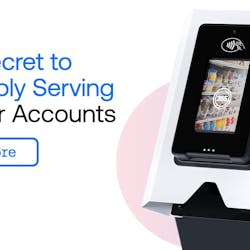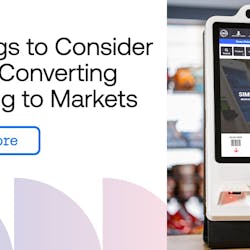When you’re opening your first few micro markets, it’s an easier task to give a lot of attention to each individual one. You can ensure that the customer is satisfied with the service and products being offered. You can spend more time reviewing what customers are buying and when.
But what happens when you open your twentieth market? Your fiftieth? Your two-hundredth micro market?
Suddenly it becomes more challenging to focus on the individual location’s market each day. Despite the difficulty, it is imperative to foster that individual location partnership and maintain or strengthen the same level of dedication year after year.
Dedication is key to micro market success, especially long after the grand opening. But what does that mean? How can an operator ensure that he or she is providing dedicated service? Is it based on the complaints or lack thereof from locations? Here are a few tips to manage a long-term business partnership to make sure the market you place stays there for the long haul:
1. Be consistent:
One year into a micro market placement will not be nearly as exciting as the first day. That means operators must strive to actively make changes in the market, from signage to product offerings. This “refresh” should be consistent. Consistency in all things, from product changes to communication to responsiveness, is important in solidifying a strong business relationship. Consistency enables trust and when a customer trusts you, they are more likely to keep you.
2. Be timely:
You have to make sure that when something goes wrong, you’re there to resolve the issue “right now”. Not tomorrow or after you service another location. Timeliness shows that you have respect for the customer. Even if the service is perfect in every other aspect, if it’s not timely, it won’t succeed.
3. Listen and respond:
Just because you’re not getting any complaints doesn’t mean there aren’t any. On a regular basis, ask for customer feedback, from the office and human resources manager, as well as the kiosk end user. This shows that you not only care about a specific location’s concerns and input, you also are establishing an ongoing conversation and communication with the customer. Set up an automatic questionnaire or survey that goes out in a timely manner and then use that information to address key concerns.
4. Know your own value:
What are the goals of each of your customer locations? Do you know? Does the location want to increase employee productivity? Great! Your micro market can do just that! For a partnership to work long term, both parties must know and respect one another’s goals.
Knowing your own goals and value will help each of your locations understand as well. Once a location believes in your service it will be harder for them to let you go. I heard of a great tip from one operator who created a “micro market ambassador” position at locations – this was someone who believed in the concept and didn’t want to see it get taken away so he or she would make sure that the market looked well-kept daily. In return the operator would put money on the ambassador’s market card every so often.
With employees leaving companies every few years, turnover at locations is high and product sales may drastically change, but long-term relationships last if both parties find value in the partnership.





